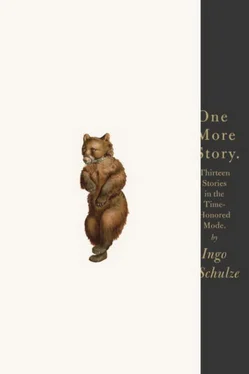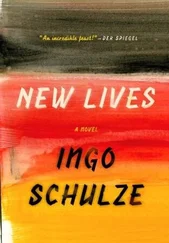Hoda introduced me to four women, including Leila, a writer from Kuwait, who gave me the once-over from behind dark glasses, as if suspecting me of being a spy. Finally she stomped her cigarette out and squeezed in beside me. Hoda shared the front passenger seat with a professor of French and Arabic literature from Cairo. The owner of the car had slid her seat so far forward that she was literally being pressed against the steering wheel.
Actually all I remember now is the women’s laughter. And that I envied them, because I had probably never laughed so hard in my life as they did during our ride. None of the women, not even skeptical Leila, could bring a sentence to an end without being overwhelmed by her own laughter. To this day I don’t know what they were laughing about. At one point Hoda slipped between the seats and fell against my knee, unleashing another salvo of laughter. She kept trying to explain something to me in English about the huge throngs at Nasser’s funeral, but what was so terribly funny about that? There were brief pauses when they had to catch their breath, but the very next word was a spark that ignited a new explosion. Even the policeman standing beside a stoplight in a vast square grinned when he saw five people crammed together, holding their hands to their mouths and laughing to the point of tears.
A grated barricade in front of the Al-Azhar Mosque slid back and we were directed to a parking place. Passing begging women and children, we walked through an underpass and arrived at the square outside the entrance to the souk frequented by tourists. We were stormed by several waiters who tried to thrust menus at us and steer us to specific chairs at specific tables in a sea of tables and chairs. In the company of these women the waiters, as well as the beggars, vendors, and roving children, no longer seemed an annoyance.
Just the opposite — they were part of the scene and prompted new topics for a conversation that branched off now and then into English for my sake. Even a carpet vendor I was certain would be rebuffed — who would be buying a carpet at this hour? — had to fulfill his role. The price fell from 160 Egyptian pounds to 70, then to 60, to 55. At which point the vendor imitated strangling himself and, cursing and shaking his head, left our table, only to hail us cordially from a distance shortly thereafter — and was soon standing again before us. Because they were such wonderful ladies — for that was what they were—45 pounds. Hoda explained that 20 would have been plenty, and she could have had it for 20, but he had been unwilling to haggle. Leila waved over a heavily made-up girl who was screeching wildly as she fought off a waiter trying to ban her from his tables. Leila had the girl approach very close, gave her a talking-to, and when she tried to run off, swiftly grabbed her by the arm, held it tight, and went on talking until the girl gave several nods and said something in response. Only then did Leila let her go. Ten minutes later the girl returned, and Leila pressed a couple of bills into her hand. A beggar slinking up from behind suddenly bent down and gave Leila a loud smooch on the cheek. Leila screamed. But then, instead of being outraged, she laughed and rubbed the kiss from her cheek with a handkerchief.
Even now, after darkness had fallen, one tourist bus after another pulled up. One guide after the other hoisted a little flag, and one group after the other climbed out and vanished in the direction of the souk. A few of these mostly elderly ladies and gentlemen — whose flipped-up sunglasses made them look a little like insects — gazed wistfully our way, took a few snapshots, and straggled after their flags.
First the sense of exhaustion returned, then the pressure inside my head. I noticed our food being served, pigeons with their tiny drumsticks bound together. While we ate — pigeons don’t offer much to gnaw at, the stuffing’s the important thing — other pigeons searched for bread crumbs at our feet. One bite and I felt an aversion, something close to nausea. I couldn’t take another, I wanted to but simply couldn’t. I had to stop, my energies were exhausted. It’s a miracle I was still able to sit upright in my chair.
After I had persuaded the women not to accompany me, they called the waiter, and the waiter called over a boy, and the boy went to fetch a cabbie. A price was settled on, and Hoda instructed me on no account to pay more than the fifteen pounds.
All I had to do was stand up and walk a few steps behind the driver — and they were all around me, a whole pack of boys. The youngest were maybe eight, the oldest maybe twelve or thirteen. But I’ve already told about that, probably far too often.
The worst part wasn’t the kids. The moment I said good-bye to the women and began to walk away, memories flooded in. Or to put it another way, everything collapsed in on me. Sheila and Samir, the conference, my failed speech, my disappointed colleagues, the hotel room with its sweat-drenched pillow. The hour and a half I had spent with the women already seemed like some pleasant movie. Now I was leaving the theater and returning to reality.
I got into the taxi. Even now I can hear the boy leaping onto the car. I just thought — Well, there’s another dent, as if this sort of damage was a normal risk in the business of transporting tourists. I didn’t want to see anything else, hear anything else. I wanted the farce I had wandered into to come to an end.
I have no idea how he was able to hang on. With his fingernails in a crack somewhere? Or with the palms of his hands, his feet on the bumper? The driver of a car that passed us pointed to the boy on our trunk and shook his head.
I wasn’t about to be blackmailed, I was determined to have my way in this.
Did it take me one minute, two minutes, before I shouted: “Stop, please, stop!”?
The taxi slowed down until we were moving at a walking pace, the boy jumped off, and the driver said, “Good idea,” as he nodded to me in the mirror but filled the silence that had reigned until now with complaints that fifteen pounds wasn’t enough.
I don’t know if it was while I was still in the taxi that I tried to imagine what it would have sounded like if the boy had slipped off. With the windows rolled up, we probably wouldn’t have heard a thing.
The cabbie wanted ten euros instead of fifteen pounds. I gave him thirty pounds, just to get away quickly.
Sheila and Samir were sitting in the hotel lobby. I think her hand was on his knee. But I didn’t care about that now. Yes, I even found it annoying when she arrived in the room ten minutes later. I heard her use the bathroom, heard her lie down, turn on her nightstand light, turn it off again soon after, and fall asleep.
The next day she was never more than twenty feet from my side, about the distance from our breakfast table to the buffet, or from the lectern to the first row at the Goethe-Institut that evening. Over breakfast — Samir was nowhere to be seen — I told Hoda, whom I had no choice but to introduce to Sheila, about the boy at the rear windshield. Hoda scowled. It was a game, a way of testing their courage. If something went wrong it wasn’t the taxi driver they went after, but the person with the wherewithal.
I scarcely remember that last day. I tried to cancel the interview before the reading because I simply couldn’t utter another word — but for some strange reason it went okay in English. My head almost exploded during the reading.
It was still dark the next morning as we rode through empty streets to the airport. I had no idea how I would manage the long trek to check-in, then on to passport control, security, and finally the gate, with drafts blowing from all sides. And then came changing planes in Paris and standing for long minutes in the February wind of an open jet bridge, Sheila with the brown doll under her arm.
Читать дальше












